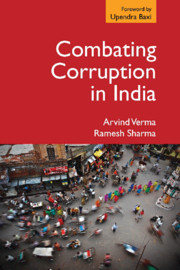2 - Corruption: Criminological Perspectives
from Part I - Corruption in India
Published online by Cambridge University Press: 13 November 2018
Summary
While corruption has become a common word it still carries different meanings for diverse people. It has been described in various ways and this poses problems for combating it effectively. We examine the various definitions and interpretations from the perspectives of law, political science and economics and argue that criminological viewpoints provide the best means to understand and deal with the crimes of corruption. The ‘rational choice’ perspective explains corruption as an economic rent but is limited, as it suggests prevention by enabling officials to function in desirable manner. Moreover, such conceptualizations also are ideologically biased towards free market economy and liberalism. These perspectives also limit the notion of corruption to public officials whereas, in the global integrated system corruption is also embedded in the private sector. This chapter argues that criminology presents a more nuanced explanation for the existence, nature and control of corruption. We reiterate the social-interaction perspective and suggest that people tend to emulate the prevailing norms and be part of the group rather than stand out alone. We argue that corruption as evil is perhaps the best manner to capture the damaging influence of this phenomenon. We also examine methods of measuring corruption and illustrate the techniques developed by Transparency International and the World Bank. Here we also describe the seriousness and nature of corruption in India presented by the National Crime Records Bureau.
The Concept of Corruption
Corruption is a heinous crime that unfortunately is also ubiquitous. The year 2011 will be remembered for the protest demonstrations that occurred across the world from India to Athens, from the ‘Arab Spring’ to ‘Occupy Wall Street’ phenomena. These public demonstrations were peculiar to each country but corruption was a common denominator everywhere. Indeed, corruption has become a global problem that affects almost all nations across the world. It is also true that corruption has seeped into every aspect of human life. Corruption exists in sports, development, education, health, finance, mineral exploration, security and humanitarian aid, and of course governance and politics, to name a few. While efforts such as the United Nations Convention against Corruption, Right to Information Act and Whistle Blower Protection Act are welcome measures to combat corruption, clearly these have failed to prevent or check corrupt practices. The basic fact is that, ‘corruption is universal.
- Type
- Chapter
- Information
- Combating Corruption in India , pp. 19 - 43Publisher: Cambridge University PressPrint publication year: 2018

